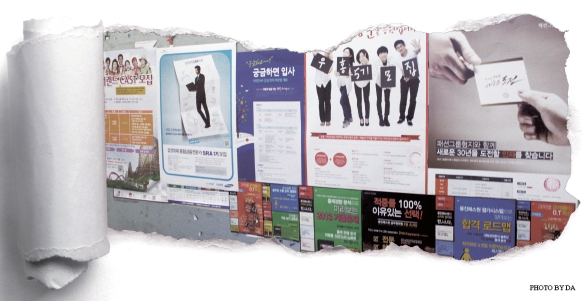
1500:1, it’s not the competition rate of a large company. It’s the rate for the people who are gathered to be ‘How to Live Smart supporters’ of Samsung Electronics. Jang Yewon, SBS announcer, School of Communication and Media ‘10, became famous not only for her age, but also for her career. She participated in 13 off-campus activities for two years. Like her case, many students have an interest in off-campus activity and most of them are members of off-campus groups. At the site which specializes in off-campus activities, over ten kinds of activities are updated in a day. However, it’s hard to find substantial and helpful ones among over 3000 activities. Now, it is no exaggeration to say that there are too many off-campus activities.

An Off-campus Activity, Hot Issue On-campus
An off-campus activity for university students is an activity which is conducted by a government organization or company. There are many kinds of off-campus activities, including marketing, reporting, supporting, overseas inquiry, volunteering and contest exhibits. Now many companies are planning programs which are for students and the scale keeps getting bigger and bigger. The number of offcampus activities in Korea is now over 3000.1 It is almost saturated. And the process of selection is similar with one for entering a company. When one passes the application phase, he or she also does an interview. Even though it is hard to be a member of an off-campus activity, more and more people are applying for it. Their average competition rate is 10:1. Surprisingly, an expedition of coffee culture in Europe from CaffeBene reached over 700:1. An off-campus started to be a compulsory spec* including grades and English skills.

Charming Off-campus Activities, WHY?
From the large company to the small company, almost every company offers off-campus activities. So it’s hard to find the company which does not offer them. From 2010, an exposition for them started and attracted over 3300 people on the first day.2 Then, how have these programs started to attract students? The biggest reason is to raise their competitiveness in employment. Students realized that they cannot compete with others only with grades and English, so they decided to apply for an off-campus activity which can be added to their resume. Some companies also offer chances for an internship or an exemption of application. Kim, Division of Law ’12, said “I feel like I am getting left behind other students, so I applied for an off-campus activity that is offered by the company which I wished to go.” Also another reason can be a vitalization of SNS (Social Network Service). Before SNS became famous, employees should work in the field to promote their new products or they needed outstanding advertisements. Therefore, companies needed more employees who were good at speaking or more copywriters who can make remarkable promotional words and phrases when they want to promote their products. It means they needed people who have special abilities. However, after SNS became prevalent among people, the way to promote it started to change. When they promoted a new product, they needed people who could spread posts which are about it. Because the company thought that hiring for people to spread posts through SNS also needs money, they started to use students who use SNS especially more than any other generation, so company attracts students by giving chances to be a marketer of that company. And students can upgrade their specs by experiencing a marketer activity.

Before We Wish Spec...
When we looked at the prior purpose of off-campus activities, it seems quite ideal. Companies can get new ideas through creative university students and have chances to get closer to young consumers. Also, students can experience the culture of business and meet people who work for the company they wished for. However, these days, some problems of off-campus activities have arisen. First of all, students could be regarded as people who help only the promotion of the company. An off-campus activity let students experience the society before they got employed, but misunderstanding of the purpose of off-campus activities made them use labor force for free. Jung, who was a supporter of public enterprise, said, “I applied for this supporter because this company worked at the part which I was interested in, but after six months, I had a memory of only promotion for that company through SNS. It was different from what I had hoped before.” Students who applied for off-campus activities for experiments only gained the memory of the promotion of new products or of certain companies. Kim, 23, who worked as the reporter of a big company, said, “I wasted over 200,000 won to move from Busan to Seoul, but the thing that company gave me was only goods which were needed for promotion. I did not want all the money for transportation, but when I got those goods, I felt like I was just an employee without pay.” Also Park, who worked as an ambassador for a famous department store, said, “Once a month, I guided people who visited the department store, and the company forced me to attend every event, so I missed classes many times.”3 Also, there were some companies which did not follow what they promised. For example, Korea Industrial Complex Corporation offered the program for six months named “QWL Valley Reporters.” They promised to give awards to people who did well from the minister of the ministry of knowledge economy. However, there was no award from the minister.4 From these statements, we can guess that companies have used university students in the name of ‘Experience.’ Most of off-campus activities give missions like updating posts at SNS to students, and every month, students report to the company. The company judges not with quality but with quantity, students only focus on updates more and more to be “the best member.” So actually, being the member of activities is not helpful to improve one’s capability. Jung Chanwoo, university student, said, “I have run my own blog as a hobby for a long time. After I became a member as an SNS marketer of a certain company, I had to upload posts which advertised that company. However, after a month, I noticed that my blog was selected as a ‘low-quality blog’ because of too much advertisement.”5 Usually when one keeps posting one particular advertisement, he or she can be blocked from that site. Some companies offered to upload also at the personal site. People were quite nervous about whether or not they should upload these kinds of things. But when they want to be selected as the best members, they should bear it. When they serve out their terms, most of them do not feel they’ve improved at certain skills because what they did was just uploading posts about that company. And unlike what we think, off-campus activities are not that important when we get a job. The people from Job Korea, which specialized in the information of employment, said, “Recently, students started to focus on off-campus activities a lot. Last year, seven out of ten students participated in this program because of specs.”6 Now because many students are doing off-campus activities, it is becoming mandatory. Son, Division of Education ’12, said, “Even though I am a freshman, I have to be frustrated by doing some activities which can be helpful for my future. So when I saw my friends, I felt like I had to do something, even if I had no interest.” However, unlike most students think, a recent survey showed that the number of off-campus activities is not proportional to getting a job. There was a survey targeting 296 human resource directors from diverse companies. According to the survey, 83.1% of applicants have specs which are unnecessary. Among the unnecessary specs, “the experience of volunteer” accounted for 30.9% and “the experience of supporters and the contest exhibit” accounted for 17.9%.7 It showed that the experience related to offcampus activities did not directly connect to the job.
All You Need is Your ‘Own Story’
It is undeniable that we can experience a lot more through off-campus activities. We can meet people off campus, and women’s university students especially appreciate the chance to meet male students. However, we have to think about our own story before we do activities indiscriminately. A human resource director from a large company said, “Actually companies do not give additional points because of the fact that a person has an experience of being a supporter or marketer of that company. Applicants should think about what they learned and how these activities can be connected to their role at that company.”8 As he said, only the sentences that prove the experience of off-campus activities is not that important. We should think and know how this can help our future and the right purpose of this. That means through this experience, our own story should be made. The name of the company is unimportant. We should remember never to judge from appearance.
1 Shin Iktae, “Over 3000…set the fox to keep the geese,” Dongailbo, May 29, 2012
2 Heo Sangcheon, “2012 Univexpo Busan, Successfully Opened,” Newsis, September 13, 2012
* “Spec” is short for “specification.” It means the skills needed for getting a job.
3 Chae Sangwoo, “An Off-campus Activity only for Employment can be Minus,” Herald Economics, September 19, 2012
4 Kim Jinsu, Kim Minji, “Damm off-campus Activities,”Dongailbo, May 29, 2012
5 Yang Eunjin, “Is There no Problems of too many off-campus activities?,”GongGamKorea, January 21, 2013
6 Same as Footnote 2
7 Kim Namhee, “83.1% Human Resource Directors Said..’Useless Spec of Applicants is..’,”Saegaeilbo, January 15, 2013
8 Same as Footnote 3


